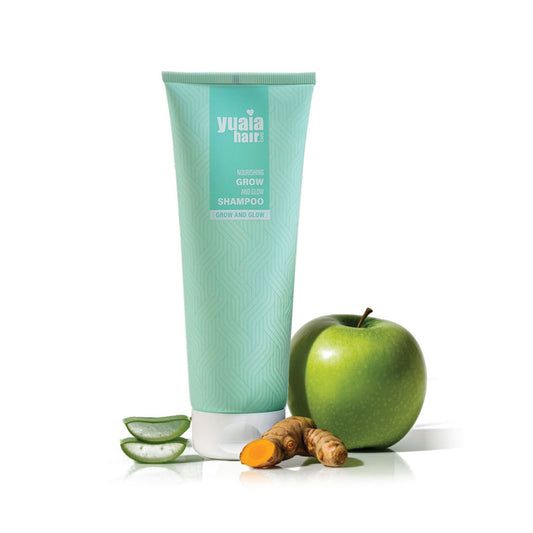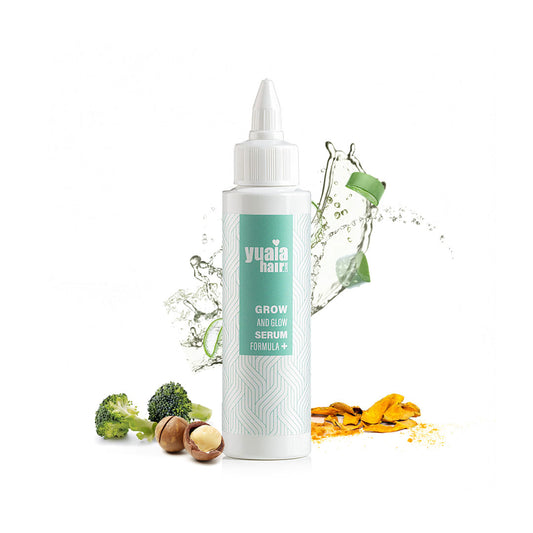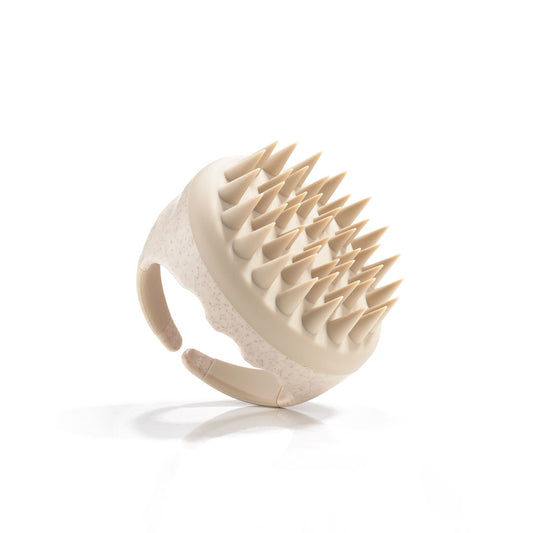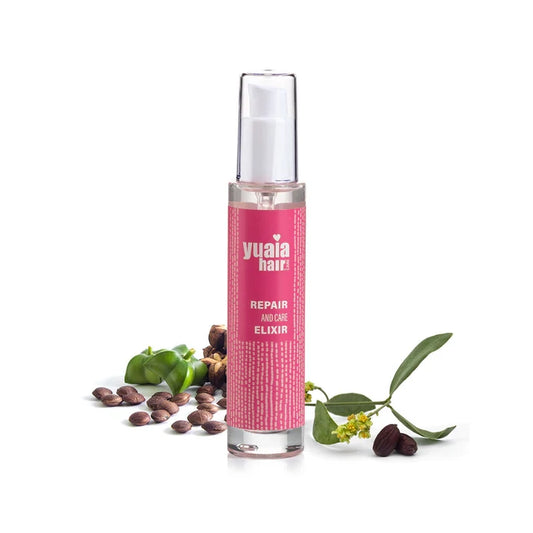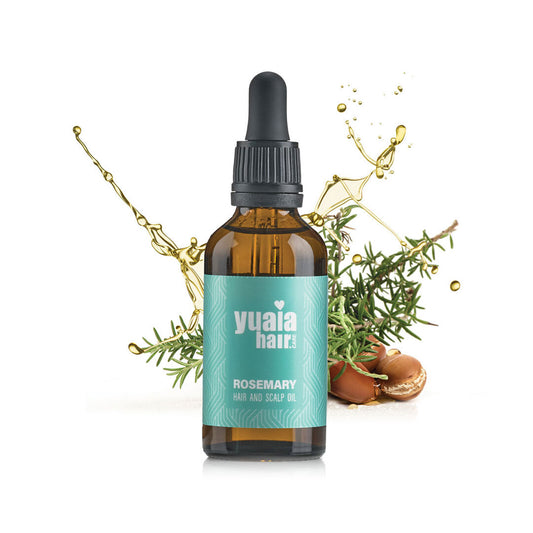
Reduces hair loss
Fenugreek helps reduce hair loss by strengthening the roots and nourishing the scalp. This action reinforces the base of the hair strand, making it more resilient against shedding due to daily stressors like brushing or styling. Its anti-inflammatory and antioxidant properties protect hair follicles from damage and oxidative stress, contributing to a healthier scalp environment. These benefits may also support the regeneration of weakened follicles and aid in balancing the scalp’s oil production, creating ideal conditions for sustained hair retention and density.
Combats dandruff
The antifungal and antibacterial properties of fenugreek make it effective in treating dandruff and alleviating scalp irritation. These properties help reduce microbial growth on the scalp, which can be a major cause of flaking and itching. Fenugreek also soothes inflammation and dryness, which often accompany dandruff issues. Regular application can help restore balance to the scalp’s microbiome, promoting a healthier environment for hair follicles and reducing the recurrence of scalp conditions over time.
Enhances hair texture
Fenugreek’s mucilaginous content acts as a natural conditioner, leaving hair smoother, shinier, and more manageable. Its slippery consistency coats each strand, helping to detangle and reduce breakage during styling. It locks in moisture and prevents dryness, making it especially helpful for those with frizzy or coarse hair.
With regular use, fenugreek may improve the overall elasticity of hair and restore softness, making it easier to manage and style. This conditioning effect also enhances the natural sheen of the hair, giving it a healthier and more vibrant appearance.
Prevents premature greying
The nutrients found in fenugreek are also believed to delay the appearance of grey hairs. These include antioxidants and specific amino acids that may help in preserving melanin, the pigment responsible for natural hair color. While more research is needed, anecdotal evidence suggests it may help retain natural hair color when used consistently. Some users report that with regular application—especially in oil or mask form—hair appears darker and more vibrant over time. Although not a replacement for conventional coloring treatments, fenugreek might offer a gradual, plant-based approach to maintaining youthful-looking hair.
Application methods for fenugreek
There are several effective ways to incorporate fenugreek into your hair care routine, each offering unique advantages depending on hair type and goals. Whether used as a mask, oil, or rinse, these methods allow you to experience the herb’s full benefits through easy, natural applications.
Fenugreek hair mask
Fenugreek hair masks are a popular natural remedy for promoting scalp health and softening hair. To prepare the mask, soak fenugreek seeds in water overnight. The next day, grind them into a smooth paste. For additional nourishment, mix the paste with yogurt or a few drops of essential oils such as rosemary oil or tea tree. Apply the mixture generously to the scalp and throughout the hair. Cover with a shower cap and let it sit for 30 to 45 minutes. Rinse thoroughly with a mild shampoo. This treatment helps condition the hair, reduce dryness, and relieve itchiness on the scalp.
Fenugreek oil infusion
Combine fenugreek seeds with coconut oil or castor oil and heat gently to infuse. Let the oil cool and strain it. Use as a scalp massage oil, focusing on dry or thinning areas. This promotes circulation and supports hair strength and shine.
Fenugreek hair rinse
Boil fenugreek seeds in water for about 10–15 minutes to extract their beneficial compounds. Once the water turns golden and fragrant, remove it from heat and allow it to cool completely. Strain the liquid into a clean container and discard the seeds. After shampooing your hair, pour the cooled fenugreek water slowly over your scalp and hair as a final rinse. Gently massage it in for a few minutes to enhance absorption. Let it sit for an additional 5–10 minutes before rinsing out with plain water or leaving it in, depending on your hair’s needs. This rinse helps reduce dandruff, adds natural shine, and leaves your hair feeling refreshed and revitalized.
Does fenugreek really regrow hair?
The question of whether fenugreek truly promotes hair growth has attracted growing interest among many. While scientific data remains limited, early indications are encouraging. Some preliminary studies suggest that fenugreek may contribute to reducing hair loss and improving scalp health due to its anti-inflammatory and antioxidant effects. In particular, one small-scale study reported improved hair volume and strength in participants using fenugreek extract, though the sample size and methodology were limited. Laboratory tests of the plant’s bioactive compounds also point to a potential role in stimulating hair follicle activity. Despite these promising signs, most evidence is still anecdotal or derived from small observational studies. To confirm fenugreek’s role in promoting hair growth, larger and more controlled clinical trials are needed, along with clear guidelines for usage and dosage.
Precautions
Although fenugreek is a natural remedy, it may not be suitable for everyone. Individuals with allergies to legumes should conduct a patch test before applying fenugreek topically.
Why fenugreek deserves a place in your hair care routine
Fenugreek offers a wide range of potential benefits for hair health, from stimulating growth to combating dandruff and improving texture. Its nutrient-rich composition and natural healing properties make it an appealing choice for those seeking plant-based solutions in their hair care routines. While ongoing research will continue to shed light on its efficacy, many already swear by the power of fenugreek for healthier, stronger hair.
Frequently Asked Questions
How do I use fenugreek for hair growth?
You can use fenugreek for hair growth by making a hair mask with soaked and ground fenugreek seeds, infusing the seeds in oil for scalp massages, or preparing a fenugreek water rinse. Each method helps nourish the scalp and strengthen hair follicles.
Can fenugreek help with dandruff?
Yes, fenugreek has antifungal and antibacterial properties that help combat dandruff and soothe scalp irritation. Regular use can help restore scalp balance and reduce flaking and itching.
Are there any side effects of using fenugreek on hair?
Fenugreek is generally safe for topical use, but individuals allergic to legumes should perform a patch test before applying it to the scalp. If irritation occurs, discontinue use and consult a healthcare professional.
How often should I apply fenugreek to my hair?
For best results, use fenugreek treatments 1–2 times per week. Overuse may lead to buildup, so adjust frequency based on your hair type and needs.
Does fenugreek change hair color or prevent greying?
Fenugreek contains antioxidants and amino acids that may help preserve natural hair color and delay premature greying. While it is not a substitute for hair dye, consistent use may help maintain a more youthful appearance.
 2-4 day UK delivery
2-4 day UK delivery
 25.000+ satisfied customers
25.000+ satisfied customers
 Satisfaction Guarantee
Satisfaction Guarantee



















